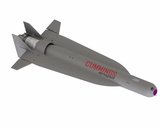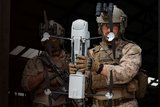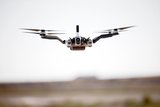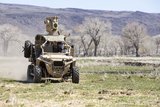Academia teams with US Army on robotic combat vehicle research
The US Army Ground Vehicle Systems Center is working with researchers at Clemson University in South Carolina to study how Bradley IFVs and in-service APCs can be converted to autonomous operation.
This research is underpinned by an $18 million DoD grant to build a Virtual Prototyping of Ground Systems (VIPR-GS) Center at Clemson.
A multi-year project will involve 60 university faculty members across seven engineering disciplines. It will focus on off-road autonomy for multi-scale vehicle fleets, including manned-unmanned teaming (MUM-T); propulsion systems and smart energy; and virtual prototyping and digital engineering for autonomy-enabled off-road vehicles.
Researchers will build and validate various virtual models and simulations for off-road vehicles with advanced electrified propulsion, situational intelligence, AI-enabled autonomy and team-routing algorithms.
Development of robotic or autonomous combat vehicles feeds into one of the main modernisation priorities for the US Army. In trials held at Fort Carson in July-August (pictured), modified Bradleys and modified M113 APCs were tested to help develop learning objectives for the MUM-T concept.
As part of our promise to deliver comprehensive coverage to our Defence Insight and Premium News subscribers, our curated defence news content provides the latest industry updates, contract awards and programme milestones.
More from Uncrewed Vehicles
-
![Cummings Aerospace showcases Hellhound loitering munition designed for US Army’s LASSO programme (video)]()
Cummings Aerospace showcases Hellhound loitering munition designed for US Army’s LASSO programme (video)
Cummings Aerospace presented its turbojet-powered Hellhound loitering munition at SOF Week 2025, offering a man-portable solution aligned with the US Army’s LASSO requirements.
-
![SOF Week 2025: PDW unveils attritable FPV drone for SOF operations at scale]()
SOF Week 2025: PDW unveils attritable FPV drone for SOF operations at scale
PDW has revealed its Attritable Multirotor First Person View drone at SOF Week 2025, offering special operations forces a low-cost, rapidly deployable platform for strike and ISR missions, inspired by battlefield lessons from Ukraine.
-
![SOF Week 2025: Teledyne FLIR white paper provides guidance on reusable loitering munitions]()
SOF Week 2025: Teledyne FLIR white paper provides guidance on reusable loitering munitions
Teledyne FLIR is highlighting the emerging requirements for 'recoverable and re-usable' loitering munitions across the contemporary operating environment during this week’s SOF Week conference in Tampa, Florida.
-
![SOF Week 2025: Kraken Technology group debuts K3 Scout USV in North America]()
SOF Week 2025: Kraken Technology group debuts K3 Scout USV in North America
High-performance maritime industry player Kraken Technology Group, based in the UK, has used the SOF Week conference in Tampa, Florida this week to debut its K3 Scout uncrewed surface vessel (USV) to the North American market.
-
![Palladyne AI and Red Cat to demonstrate capabilities for autonomous drone swarms to the US military]()
Palladyne AI and Red Cat to demonstrate capabilities for autonomous drone swarms to the US military
Red Cat and Palladyne AI recently conducted a cross-platform collaborative flight involving three diverse heterogeneous drones.
-
Jammer resistant drone designs spark search for countermeasures
The Russia-Ukraine conflict has driven another stage of evolution for drones and the counter measures to defend against them.

























